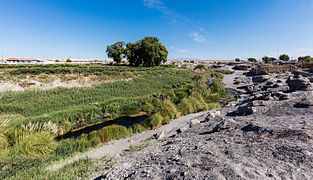Loa River
| Loa River | |
|---|---|
 Map | |
| Location | |
| Country | Chile |
| Physical characteristics | |
| Source | |
| - location | near |
| - coordinates | 21°11′59″S 68°40′05″W / 21.1996°S 68.668°W |
| - elevation | 4,277 m (14,032 ft) |
| Mouth | |
| - location | Pacific Ocean |
| - coordinates | 21°25′48″S 70°03′27″W / 21.43°S 70.0576°W |
| - elevation | Sea level |
| Length | 440 km (270 mi)[1] |
| Basin size | 33,570 km2 (12,960 sq mi)[1] |
| Discharge | |
| - average | 2.43 m3/s (86 cu ft/s) |
| Basin features | |
| Tributaries | |
| - left | San Pedro de Inacaliri River Salado River |
| - right | San Salvador River |
The Loa is a U-shaped river in Chile's northern Antofagasta region. It is the longest river of the country and the main river in the Atacama Desert.
Geography
[change | change source]The Loa river has a length of 440 km (273 mi), and a drainage basin with an area of approximately 33,570 km2 (12,961 sq mi).[1]
Course
[change | change source]The Loa river starts on the Andean mountain slopes at the base of the Miño volcano near the Bolivian border, at an elevation of about 4,277 m (14,032 ft), in the comuna of Ollagüe, Calama, Antofagasta.
The river flows south, for about 150 km (93.2 mi), to the oasis of San Francisco de Chiu Chiu or simply Chiu Chiu. Two left tributaries joints the Lao river in this part the riverː
- San Pedro de Inacaliri, or simply San Pedro, river. It joints the Loa river before Chiu Chiu.
- Salado river. It joints the Loa river about 3 km (1.9 mi) south of Chiu Chiu.
From Chiu Chiu, the Loa flows to the west, running through the city of Calama. The San Salvador river joints the Loa in this part of course as its only important right tributary.
Then the Loa flows north for about 80 km (49.7 mi) to Quillagua, an oasis in the comuna of María Elena, Tocopilla province in the Antofagasta region of northern Chile. The Loa is crossed by the Pan-American Highway in this area.
From Quillagua, the river turns westward again and marks the border between the regions of Tarapacá and Antofagasta. Finally, the Loa flows in the Pacific Ocean.
Main tributaries
[change | change source]Because the Loa river flows throug a very arid region, a desert, there are very few permanent tributaries; they areː
- Left tributaries
- San Pedro de Inacaliri - 75 km (46.6 mi) long.[2]
- Salado - 80 km (49.7 mi) long.[3]
- Right tributary
- San Salvador - 56 km (34.8 mi) long.
Gallery
[change | change source]-
The Loa in Chiu Chiu
-
Loa river and its left tributaries
Related pages
[change | change source]References
[change | change source]- ↑ 1.0 1.1 1.2 "Cuenca del río Loa" (PDF) (in Spanish). Ministerio de Obras Públicas - Dirección General de Aguas. Archived from the original (PDF) on 24 September 2015. Retrieved 24 July 2016.
- ↑ "Río San Pedro" (in Spanish). Ríos de Chile. Archived from the original on 3 April 2016. Retrieved 25 July 2016.
- ↑ "Río Salado" (in Spanish). Ríos de Chile. Retrieved 25 July 2016.
Other websites
[change | change source]- Cuenca Río Loa Archived 2015-09-24 at the Wayback Machine (in Spanish)


